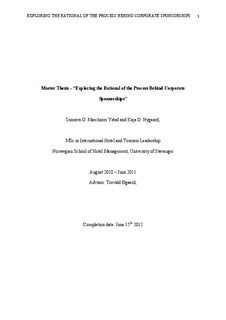Exploring the rationale of the process behind corporate sponsorships
Master thesis
Permanent lenke
http://hdl.handle.net/11250/185121Utgivelsesdato
2012Metadata
Vis full innførselSamlinger
- Studentoppgaver (SV-NHS) [618]
Sammendrag
The purpose of this thesis was to examine and identify the process behind the delegation of corporate sponsorships in a Norwegian context. Corporate sponsorships are presently the third largest corporate communication channel in Norway. However, there is limited research on sponsorship management. The thesis seeks to identify the process and investigate the rationale behind it. To be able to research this, an explorative study was conducted, by means of a grounded theory design.
First, a model of a professionalized sponsorship delegation process was developed based on existing theory. The model suggests that the process consists of five steps: setting sponsorship strategy, setting sponsorship objectives, setting sponsorship criteria, selection of sponsorship partners and evaluating the effectiveness of the sponsorships. Two banks were sampled, and data related to the presented model was derived from in-depth interviews with the bank’s sponsorship/market managers. It was identified that the two banks’ main concerns are linked to the evaluation, which they do not perform, and relating the sponsorships to CSR.
Secondly, a theoretical framework of CSR was presented and used to further develop the interview guide. Two additional banks were sampled, and data was derived in the same manner as before. The results from these interviews emphasized the importance of the commercial parts of sponsorships.
Finally, the two discussions were compared. The findings show that all respondents to some degree have developed, or are developing, a sponsorship strategy, sponsorship objectives and sponsorship criteria. Furthermore, CSR is not found to be the rationale behind the process. However, the degree of professionalism in the sponsorship delegation in Norway differs. Sponsorship evaluation is distinguished as the most problematic step in the process. Furthermore, respondents that have centralized their sponsorship management, and hence decision-making authority, appear to have a more professionalized process.
Beskrivelse
Master's thesis in International Hospitality Management
